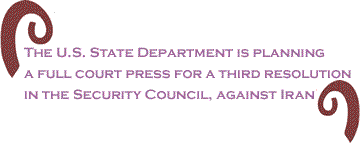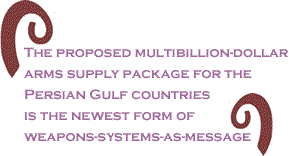
|
|||||||||||||||||||||
|
||||||||||
|
||||||||||
 |
||||||||||
 |
||||||||||
Last Friday, CNN’s senior political analyst did at segment on Presidential candidate Rudy Giuliani, observing that the Republican Party wants the 2008 Presidential campaign to turn on the question of terrorism. It makes sense given the declining prospects for the party, worn down by endless scandals and a tanking economy. The question is, how far is the GOP prepared to go to change the subject? Noting the stepped up agitation for launching a military attack on Iran, one blogger noted the previous day, “This campaign is getting scarier by the second.” Especially as one of the former New York mayor’s foreign policy advisors is: “None other than Norm Podhoretz, the longtime Commentary editor who recently suggested that we'd be nuts not to immediately bomb Iran.” On Sept. 6th, the New York Sun predicted that this week the Bush administration “will step up its diplomatic campaign against Iran in an effort to thwart its quest for a nuclear bomb, in anticipation of the coming meeting of the International Atomic Energy Agency.” It seems the Administration’s tactical problem in reviving up the campaign for action against Teheran is how to head off action by the Agency seeking to secure cooperation from the Iranians. IAEA Director General Mohamed ElBaradei recently revealed that Iran has agreed to cooperate in providing requested information on its nuclear development program. He has suggested that the Iranians should be given more time. ElBaradei told the New York Times, "This is the first time Iran is ready to discuss all the outstanding issues which triggered the crisis in confidence.” However, the U.S. State Department is planning a full court press for a third resolution in the Security Council, against Iran. Sound familiar? How about the lead up to the invasion of Iraq, which was quickly launched when Baghdad announced its intention to allow UN inspectors in to search for nuclear weapons that the Administration said existed and which we now know didn’t? History sometimes repeats it self as a farce; in this case it threatens a planetary catastrophe. "World peace is at risk," said ElBaradei, because of "new crazies who say, 'let’s go and bomb Iran.'" “The diplomatic problem on Iran awaiting the Bush administration on Iran may lead to a military option,” wrote Eli Lake in the Sun. “President Bush has said repeatedly that he neither rules in nor rules out a military attack on Iran's known nuclear facilities, using the phrase ‘all options are on the table’ when asked whether the Pentagon is planning to bomb Iranian nuclear targets.”
In May, Podhoretz wrote in Commentary, "I hope and pray that President Bush will do it.” The President himself said recently that Iran has put the Middle East “under the shadow of a nuclear holocaust” and predicted action against Iran would come “before it is too late.” Never to be outdone when in comes to bellicosity, Sen. Joseph Lieberman (I-Conn) chimed in, "If [the Iranians] don't play by the rules, we've got to use our force, and to me, that would include taking military action to stop them from doing what they're doing." Forget the idea that the neo-conservatives have been driven to the sidelines or that the “realists” are now in charge of U.S. foreign policy. The people who brought us the invasion and occupation of Iraq are very much in position and working hard on a new military conflict, this time with Iran. Elliott Abrams, Podhoretz’s son-in-law, is deputy national security adviser to President George W. Bush. Another vocal advocate for action against Iran, David Wurmser, is Vice-President Dick Cheney’s deputy assistant for national security affairs. And don’t wait for the major mass media in the U.S. to adequately inform the public of the danger of a military attack on Iran. Almost totally ignored on its pages and on the airwaves was the Sept. 2nd report in the London Times that “The Pentagon has drawn up plans for massive air strikes against 1,200 targets in Iran, designed to annihilate the Iranians’ military capability in three days, according to a national security expert.” According to the paper’s correspondent, Sarah Baxter, Alexis Debat, director of terrorism and national security at the Nixon Center, told a recent public meeting of conservatives that the plan was not for “pinprick strikes” against Iran’s nuclear facilities. “They’re about taking out the entire Iranian military," he said. The same day, another British newspaper, The Telegraph, reported that the neo-conservative Heritage Foundation had recent completed a “war game” stimulation of the effects of attacking Iran. One story that did attract some attention was the report that the Israeli government did not goad the Bush Administration into attacking Iraq in 2001, that in fact the Israelis saw it as a diversion from what should be on the agenda: taking out Iran. Word these days amongst the conservatives and their neo-cousins is that Tel Aviv went along with the propaganda campaign leading up to the war on Iraq on the assumption that it was only a preliminary step. “The word among the neocon family is Cheney believes Bush will stick to his pledge not to leave office 16 months hence with Iran's nuclear facilities unscathed,” right wing columnist Arnaud de Borchgrave wrote in June. On Aug. 8th, former CIA operative Robert Baer wrote in Time magazine, “Officials I talk to in Washington vote for a hit on [Iran] within the next six months.”
Podhoretz wrote in Commentary,"Afghanistan and Iraq cannot be understood if they are regarded as self-contained wars in their own right. Instead, we have to see them as fronts or theaters that have been opened up in the early stages of a protracted global struggle. The same thing is true of Iran ... the main sponsor of the terrorism that is Islamofascism's weapon of choice (and) a front in World War IV." It isn't the first time the Bush administration has fumed over ElBaradei's actions,” wrote Thomas Omestad in U.S. News and World Report Sept. 7th. “Before the Iraq war, he concluded that he had no evidence to back the U.S. claim that Iraq had reconstituted its nuclear weapons program. (ElBaradei's conclusion was subsequently borne out by postwar investigation.) The administration initially opposed his renomination as director general of the IAEA, then relented.” Lake wrote in the Sun, “a Bush administration official, who asked to remain anonymous, said the IAEA was in danger of losing its status of being an honest broker in the Iran nuclear standoff. ‘We have committed to the diplomatic route for four years now,’ the official said. ‘The last thing we need is for the director of the IAEA himself to start shielding Iran from diplomatic penalties.’” Bob Kasten, another of Giuliani's "senior foreign policy team members," who supported aiding the Indonesian military during its violent occupation of East Timor, started the myth that the UN Population Fund supports forced abortion, and argued that countries should be stripped of aid if they do not vote in lockstep with the U.S. in the UN General Assembly, according to Steven C. Clemons on the website Washington Note.
“We speak to the rest of the globe in the language of violence,” Chris Hedges recently observed on the website truthdig. “The proposed multibillion-dollar arms supply package for the Persian Gulf countries is the newest form of weapons-systems-as-message. U.S. Undersecretary of State R. Nicholas Burns was rather blunt about the deal. He told the International Herald Tribune that the package ‘says to the Iranians and Syrians that the United States is the major power in the Middle East and will continue to be and is not going away.’” “The arrogant call for U.S. hegemony over the rest of the globe is making enemies of a lot of people who might be predisposed to support us, even in the Middle East,” wrote Hedges. “And it is terrifying those, such as the Iraqis, Iranians and Syrians, whom we have demonized. Empathy and knowledge, the qualities that make real communication possible, have been discarded. We use tough talk and big weapons deals to communicate. We spread fear, distrust and violence. And we expect missile systems to protect us.” Can the Administration get away with launching a new war in the Middle East before the 2008 Presidential election in order to influence its outcome or to fulfill a pledge made to its neo-conservative backers before our war in Iraq? There are a lot of persuasive arguments being made why it can’t. Among them are the potential of Iran closing the Straits of Harmuz, retaliatory attacks by Shiites in Iraq, a wave of violent reactions across the region, and a worldwide increase in acts of terror. All are possible; only the last one is a certainty. The world will become a far more dangerous place for us all.
One thing is certain. Should the White House decide to take such a dangerous step, it is unlikely, at this point, to be constrained by domestic opposition. There is no idespread sentiment for war against Iran. According to a March poll, 57% of people in the U.S. believe Iran is a threat that can be contained with diplomacy. 20% don’t see Iran as an imminent threat and only 15% support military action. However, there is practically no opposition in Congress. A Democratic Party majority, already too cowed to end the carnage in Iraq, doesn’t even want to talk about Iran. Earlier this year there was talk about a resolution requiring the President to “consult” with Congress before attacking Iran. The House Democratic Party leadership dropped the idea. “The neat little war with Iran, which few Democrats oppose, has the potential to ignite a regional inferno,” writes Hedges. And the Media (oh, the “liberal” media)? So far, is AWOL. BlackCommentator.com Editorial Board member Carl Bloice is a writer in San Francisco, a member of the National Coordinating Committee of the Committees of Correspondence for Democracy and Socialism and formerly worked for a healthcare union. Click here to contact Mr. Bloice. |
||||||||||
| September
13, 2007 Issue 244 |
|
| Printer Friendly Version in resizeable plain text format format |
 |
 |
 |
| |
| |



































